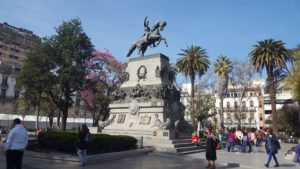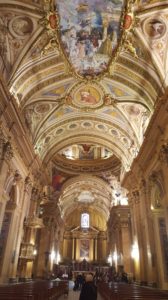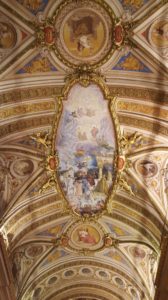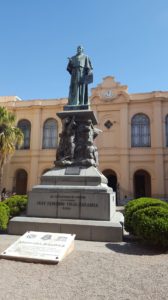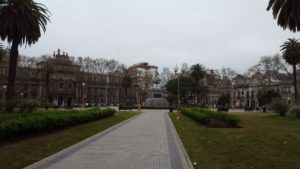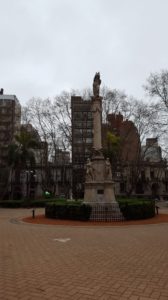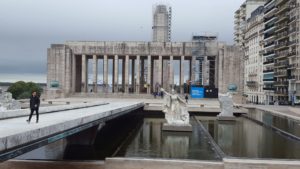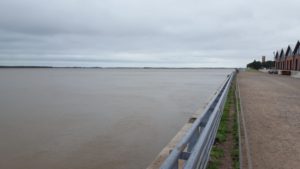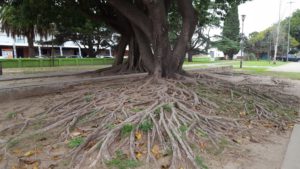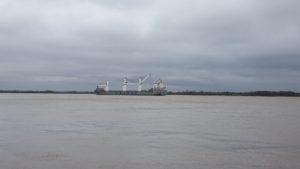
The bus ride from Santiago to the border with Argentina passed without a hitch. After getting our passports stamped at immigration, we had to wait an hour and a half at customs for our bus’s turn to be searched and inspected. I spent most of the time sitting in a small roadside hacienda eating one final choripan Italiano and buying some snacks for the road. Finally, we passed through customs and were on our way for the final three hours to Mendoza.
Two hours later the trip turned into a nightmare. At about 3:30pm our bus stopped. We sat stationary for about 30 minutes, then pulled to the side of the road. All the traffic on the road in front of us was stopped. I saw our bus drivers get out. One started walking forward and the other towards a gas station a kilometer back. They met back at the front of the bus 20 minutes later, and one of the drivers was speaking animatedly on the phone. After some hand waving and head shaking, he came back onto the bus and announced that something happened, I didn’t understand what, and that we would be stuck waiting for several hours. Most of the passengers got off the bus and headed for a nearby restaurant and the gas station. I disembarked too, and could see nothing but a stretch of cars and buses parked on the side of the road as far as the eye could see in either direction. I asked a guy standing in the road what happened, and, after some translation difficulty, I came to understand there had been a rockslide blocking the road up ahead.
As I mentioned in a prior post, there is only one road in this area of the continent that travels east to west through the mountains. The road traverses a mountain pass high in the Andes. It’s no joke. There are frequent closures of the road for all manner of reasons: snow, ice, avalanches, rockslides, you name it. I was already the victim of an outage of this road when trying to cross into Chile, and now it appeared I was bearing the burden of this forsaken road once again. I took a walk for some fresh air, then spent a couple of hours waiting it out while reading and writing on the bus.
At about 8pm, the bus driver announced we would be spending the night, hopefully leaving by 5am. I went to the only restaurant within sight, but by the time I got there it was swamped. I tried to order food, but the waiter told me they had no food left, only beer. Not so bad. I bought a 750ml beer and meandered to the gas station. The gas station had been ransacked too, but somehow there were still a couple of bags of nuts and some chocolates still on the selves. I also had some fruit and other goodies in my bag on the bus. I sat on a log on the side of the road having my impromptu dinner, beer, and smoked a few hand rolled cigarettes while looking at the stars and watching hoards people walk around confusedly.
Finally, I headed into the bus, put on my sleep mask, and tried to get some sleep. Unfortunately, this bus wasn’t meant for overnight trips and the seats didn’t recline very much. It was hard to get comfortable, and I barely got any shut eye.
The road wasn’t cleared until 8am the next morning. Our bus had to wait in queue another hour before its turn to pass the freshly cleared road. I saw several huge boulders and a lot of smaller (think 300+lbs rocks) rubble and logs on the side of the road where bobcats and backhoes were working as we passed by.
Finally, we arrived in Mendoza at 10:30am. I said ‘fuck it,’ and bought a bus ticket to Córdoba for 7:30pm the same night. I put my big backpack into luggage storage at the bus station then headed to Perregrino café for breakfast. I chilled there until about 1pm, when I headed out for a walk. I wound up in the central park, and laid in the grass under a tree attempting to sleep for a couple hours.
I passed another couple hours in DunKen Café writing and people watching on the main pedestrian street of Mendoza.
At 6pm, I moseyed to the bus station. I passed an hour having a beer in a bar and flirting with my sexy, goth waitress who was surprising into this clean cut white boy. Finally, I got my backpack out of storage and boarded my night bus. I had paid up for a good, 160-degree reclining seat, but when I sat down I realized the seat was broken and only reclined about 40-degrees. MOTHER OF GOD! Luckily, there were still several empty seats when the bus left the station. I changed into an empty seat, put on my sleep mask and hoped to get a decent night’s rest.
The bus stopped at several small bus stations, letting passengers on and off, on the way to Córdoba. At about 1am, I received the dreaded tap on the shoulder. I groggily removed my sleep mask and a girl told me I was in her seat. I moved to another vacant seat, and was able to get back to sleep until the bus arrived in Córdoba at 6am.
I walked 10 blocks to Turning Point Hostel. I just wanted to sleep—in a bed(!)—for a few hours, but my bed wasn’t going to be ready until 2pm. I attempted to sleep on a couch in the living room for a couple of hours until sunlight beaming through the window made it impossible. I headed out to Bursatil Café for breakfast, and then went to the main plaza to meet for the walking tour at 10:30am.
Córdoba is the second largest city in Argentina with a population of about 1.5 million. It’s located almost exactly in the center of the country, in the fertile plains region called the Pampas, famous for its incredible, pastured beef. Córdoba is home to several universities, making it something of a college town. Indeed, it seems like the population there is overwhelming weighted towards young people. As such, there’s quite a happening nightlife in the city, with all sorts of trendy restaurants, cafes, pubs, and, of course, boliches (nightclubs).
The walking tour was good. To be honest, all the walking tours I’ve taken recently are starting to blend together in my mind, and I can’t really remember any distinct details of this particular tour (I was really tired during it too). Still, the free walking tours are my favorite thing to do during my first couple of days in a new city, as they help orient you to the city, give you a historical perspective, and the guides give you suggestions on things to do.
Back at the hostel, I finally was able to check-in at 2pm, and immediately laid down for a siesta until 6pm.
In the evening, I met Brody (25, California) who was a volunteer at the hostel. He had spent two years living in Spain, so spoke nearly fluent Spanish. He was in the first month of what he hoped to be two years traveling South and Central America. We immediately became buddies and had a few beers together over pizza that night.
The next day, I spent an hour in the morning doing yoga on the patio of the hostel, then had a long, leisurely breakfast. Later, I headed out to explore the city further. I walked around for several hours. I headed down to the lovely Güemes neighborhood, which is the center of the nightlife, for lunch and a beer, and also explored around the main plaza including several pedestrian streets with a lot of shops and restaurants. My overall impression of Córdoba was that it was nice, but underwhelming. It was more of a second or third tier Latin American city, which surprised me considering it is the second biggest city in Argentina, one of the wealthier countries down here.

In the evening, I went out with Brody and a group of his friends from France: Luka, Martin, and Adrian. We headed to a hip outdoor bar called Dada Mini in Güemes.
The typical night out in Argentina is a very late night affair. It usually starts with a couple of beers or cocktails around 9pm, then dinner starting at 10 or 11pm, then more pregame at someone’s house or a small bar until 2am or so, then finally to the boliche until 6-8am. Or later. The clubs are usually open until 10am-12pm(!!!). Sometimes it’s followed up by group breakfast before finally going home. Sometimes people go directly to work from the boliches. In Argentina, work the next day is not a valid reason to not go out all night. It’s nuts. I don’t know how these people do it every weekend.
After several beers and bottles of wine at Dada, it was already 2am. We headed to a popular boliche, but there was a line out the door about 100 people long. We ducked into a brewery next door to have some beers and see if the line shortened soon. Before too long, our group was getting drunk in the Cerveceria with the adjacent table of Argentines, and we forgot about the club. The brewery closed at 4am. There was still a line at the boliche. The French guys just wanted to go home and get high, so we said fuck the club and called it a night.
The next morning, I was a bit hungover and started the day slowly. It was a windy overcast day which contributed to setting the mood for a quiet day. I did yoga in the courtyard of the hostel and made a gigantic brunch before showering and finally heading out around 3pm. I took a walk to explore the city some more, but the combination of the unpleasant weather and still feeling a bit crude from the prior night had me in a low state. Only one thing could cure this funk. I found a café with tables set in the middle a pedestrian street that was out of the wind, and ordered a big bottle of Stella. I sat for an hour and drank beer while watching the people pass by as the day turned to night. After the beer I felt distinctly better, livelier.
I returned to the hostel to find two good looking Argentine girls hanging with Brody on the patio. I joined them for a couple of beers. The girls were from Santa Fe and had come to Córdoba for the night to see a band that they were basically groupies of. The band wasn’t going on until 2am, so we all hung out for a couple of hours, waiting to go out later.
I realized the Mayweather vs. MacGregor fight was that night. I tried to rally the troupes, but no one else was interested in watching it. I got details on the concert venue from the girls, and vowed to meet them there after the fight.

I headed to Güemes, and after stopping by a few different sports bars, finally found a place showing the fight. It was packed to the gills. I was lucky to find a single seat open at the bar. I sat down, ordered a beer, and immediately struck up conversation with Pablo from Buenos Aires seated to my left. He was a web designer in town for a few days meeting with a client. My general impression of Argentine men is they’re kind of hard asses. Pablo was certainly more of an intellectual, but also exuded the typical hard ass-ness. As such, he asked me if I wanted a drink, and, when I responded in the affirmative, didn’t ask what I wanted and simply ordered me a double Jim Beam on the rocks. Well, alright, man!
We hung out, getting sloppy together, while watching what seemed like eight undercard fights. Just before the main event started, Paul from Texas sat down on the other side of me. He worked for a travel startup and was also in town for business. Pablo is Spanish for Paul, so we made some jokes, then the three of us continued getting hammered while watching the Mayweather vs. MacGregor fight. They actually thought MacGregor was going to win after the first five rounds. They made me bet them a shot each, which I of course took (even though I detest Mayweather). Rubes. After Mayweather knocked out MacGregor shortly thereafter, they protested but then bought a round of shots. I was pretty pie-faced at that point and didn’t even want a shot, but slammed it down with my amigos.
Soon after, the bar was closing. Pablo took off, but Paul wanted to keep partying. I was already wobbly from all the Jim Beam, so if I went out late night, it was going to be bad news. I said goodnight, and walked 15-minutes back to the hostel, where I promptly passed out at about 2:30am. I had forgot completely about the concert with the Argentine girls. Oh well.
The sound of buses roaring by on the street outside my window and sunlight creeping into the room gave me a rude awakening at 10am. I felt like shit with a sludgy, stale taste of whisky in my mouth. I chugged some water and tried going back to sleep, but couldn’t manage. I pulled myself up by the bootstraps and took a long shower before heading out for some groceries.
At least it was Sunday, so I could just sit around playing poker all day; detoxing, recovering. I made myself meals for the day, then sat at a table in the living room of the hostel all day with my earbuds in, drinking copious amounts of ginger tea whilst playing poker tournaments. I actually won a little bit of money too.
The next morning, I sat in Bursatil café for a while having breakfast, reading. I spent an hour in the late morning walking the city, and got the feeling I had seen most of what Córdoba had to offer. I wanted to stay a bit longer to party in Güemes more and try and get laid (hey, I’m being honest, lol, lots of pretty college girls in Córdoba), but didn’t want to wait for next weekend. I headed to the bus station and bought a ticket to Rosario at 3:15pm.
I headed back to the hostel to pack up and check out. I spent an hour hanging with Brody and the Argentine-American owner of the hostel, then said my goodbyes and walked to the bus station at 2pm.
The bus made it into Rosario by 8pm. I grabbed my bags and pulled up the map on my phone. It was about 20 blocks to my hostel. I needed some exercise, so decided to walk which took me about 35 minutes with all my bags in tow.
I checked in at La Lechuga hostel, dropped my bags, and headed out for a beer.
Rosario is the third largest city in Argentina, lying in the southeastern part of the Pampas about halfway between Córdoba and Buenos Aires. It is situated on the Paraná River, which is a gateway to the Atlantic Ocean. Ships arrive in Rosario via the river and their goods are loaded onto trains at a huge railroad station to be sent through the country, making the city the main shipping hub in Argentina. Despite that, the city doesn’t feel like a drab industrial center. Instead, it has a lot of classical, colonial style buildings, and waterfront parks gives the city an open, lively feeling. Rosario has a reputation as a very athletic place, where people are always running, working out, playing soccer, riding bikes, etc. Indeed, most people know Rosario as the hometown of Lionel Messi (a legendary Argentine footballer who plays for Barcelona that some consider the best of all time).
I couldn’t find a bar nearby, so instead grabbed a couple of beers at a corner store and went back to the hostel. There, I met Marc in the living room. Marc was an interesting dude, who was born in Munich, Germany, but lived most of his life in St. Louis, summering in Germany. We hung out and had a couple of beers while getting to know some of the other hostel folk, namely Zoe, from southern Argentina who was wandering South America and volunteering at the hostel, and three Bolivian lawyers of about 40, who were staying in Rosario for six months to teach a semester at a local university. We sat on the patio, beers flowing, and then got high with the lawyers. Cool guys who were overly happy to tell us all about Bolivia.
Zoe surprised us all with a homemade dinner of milanesa de pollo, which was a terribly nice gesture. We ate like a family in the dining room, with the Bolivian guys constantly topping off our glasses with beer.
The next morning, I set out to explore the city after breakfast at the hostel. I went to the Monumento de la Bandera, a big stone monument about 10 stories high with a gigantic Argentine flag out front. I took an elevator to the top of the monument to soak in the views. It was an overcast day and started to rain just after I got to the top of the monument. A couple of guys ran out to take down the flag so it wouldn’t be defiled by the inclement weather, and, like clockwork, had the enormous flag down and folded up in about two minutes.
I spent an hour or so walking around the costanera, or waterfront parks and boardwalk, in a light drizzle, before heading back to the center of the city. I met Marc on the main plaza, and we went to the Museo de la Memoria, a museum to thousands of children who disappeared during the country’s last military dictatorship and resulting political turmoil in the 1970’s and 80’s. It was basically a one room museum, and not too much to see, but a nice lady acted as our guide and spent time explaining the history and the exhibits to Marc and I.
Afterwards, we had lunch in a café near plaza San Martin. The dismal weather put a damper on the rest of the day, and I spent it sitting in the dining room of the hostel writing.
In the evening, I again had several beers with Marc, Marco from Brazil, and Carolina, another Argentine traveler volunteering at the hostel. Again, we had a family style dinner at the hostel, this time cooked by Carolina. Apparently, they like to treat guests to dinner parties in Rosario! I was again sheepishly thankful of the unexpected gesture, and asked to compensate Carolina for the food, but she had none of it. Instead, Marc and I did the dishes.
The next morning, the weather was again depressing. Marc left on a noon bus towards Mendoza, and without him around the hostel started to feel empty. I decided to make the break for the big city, Buenos Aires. I packed up, checked out, said goodbye to Carolina and Zoe, and headed to the bus station at 3pm. I got a ticket to BA for 4pm and had a couple empanadas in the terminal while waiting.
Córdoba and Rosario, the second and third largest cities in Argentina, were both charming, but perhaps underwhelming after coming from beautiful Santiago, Chile the week before. I was excited to get out of the grey weather of Rosario and eager with anticipation to make my way to the legendary city of Buenos Aires, the “Paris of South America.”

